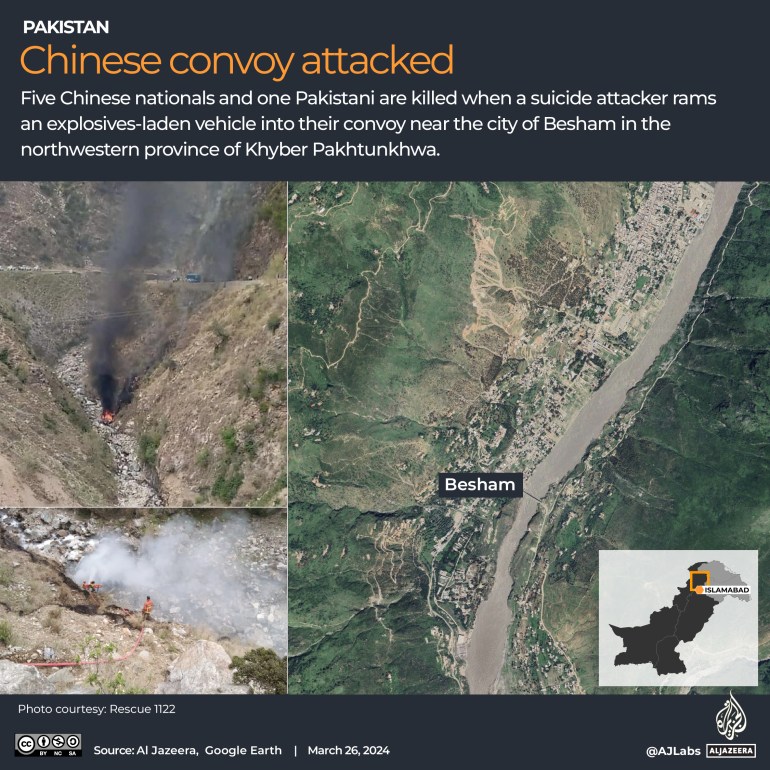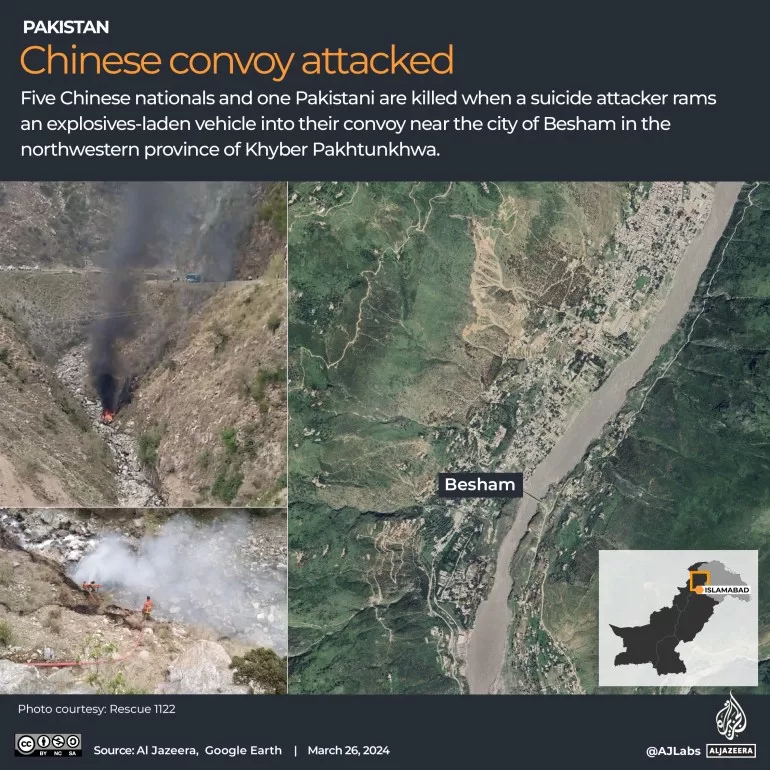All five attacks were suicide bombings, in which at least 12 military personnel, five Chinese nationals and one Pakistani citizen died.
While the country has experienced a dramatic surge in violence during the last year, the latest series of attacks, their targets, and the audacity with which they were carried out could signal a new chapter in Pakistan’s fight against armed groups, say analysts.
The last three attacks, coming so quickly in succession, appear to target Chinese interests in Pakistan. First, armed fighters attacked Pakistan’s Gwadar port in Balochistan, which was built with Chinese help. Then, an armed group attacked one of Pakistan’s largest naval bases, also in Balochistan, citing Chinese investment in the region as their motivation. And finally, fighters targeted Chinese engineers working on a Chinese-funded hydropower project in the country’s north, near Besham city.
That pattern has prompted concerns within Pakistan’s security establishment, which believes that attacks on the Chinese in Pakistan is part of a “larger plan” to hurt the economic interests of the country, as well as sabotage ties between the countries, said Iftikhar Firdous, a security analyst and researcher on armed groups.

‘Iron brothers’
China is one of Pakistan’s closest allies and has invested $62bn in the China-Pakistan Economic Corridor (CPEC), an infrastructure project that spans a series of highways linking southwestern China to Gwadar port on the Arabian Sea.
The attack on Chinese workers triggered a sharp response from Beijing. “China asks Pakistan to thoroughly investigate the incident as soon as possible, hunt down the perpetrators and bring them to justice. Meanwhile, we ask Pakistan to take effective measures to protect the safety and security of Chinese nationals, institutions, and projects in Pakistan,” its Ministry of Foreign Affairs said on March 27.
In response, the Pakistani government said it would bring “terrorists, and their facilitators and abettors to justice”, and announced the formation of an investigation team to further examine the attacks.
“Pakistan and China are close friends and iron brothers. We have no doubt that the Besham terror attack was orchestrated by the enemies of Pakistan-China friendship. Together, we will resolutely act against all such forces and defeat them,” the Foreign Ministry said in a statement issued a day later.
Chinese interests have also been attacked repeatedly in the past. Two gunmen targeted a convoy of 23 Chinese engineers in Gwadar in August last year, but their attack was foiled by security officials.
In July 2021, at least nine Chinese engineers working on a hydropower project were killed when a suicide bomber rammed into their bus, in an attack that was eerily similar to what unfolded on March 26.
But what differentiates the two attacks is that while incidents in Balochistan were readily claimed by rebel secessionist groups, the attack in the north was not claimed by any group.
Broader pattern of armed attacks
The attacks in Balochistan were claimed by the military wing of the Balochistan Liberation Army (BLA), one of the many hardline armed groups seeking to secede from Pakistan.
Balochistan is the country’s largest province by area but also its poorest, despite being rich in natural resources, including oil, coal, gold, copper and gas reserves. This has bred accusations from many in Balochistan that successive Pakistani governments have neglected their concerns while exploiting the province and benefitting “foreigners”. The province has witnessed at least five rebellion movements since the formation of Pakistan in 1947. The government has been accused of initiating a violent crackdown and allegedly killing and disappearing thousands of ethnic Baloch who are suspected of either being rebels or supporting the rebellion.
However, the significant increase in violent incidents in the country in the past two years has coincided with the return of the Afghan Taliban to power in August 2021. In 2023, more than 650 attacks killed nearly 1,000 people, mostly those associated with the security forces.
The groups carrying out attacks include the regional affiliate of the Islamic State, called the Islamic State in Khorasan Province, ISKP (ISIS-K), and other, more obscure organisations such as Tehreek-e-Jihad Pakistan (TJP) among others.
The biggest challenge to the the Pakistani state, however, has come from the Tehreek-e-Taliban Pakistan (TTP), an armed group formed in 2007 which has targeted civilians as well as law enforcement personnel, resulting in thousands of deaths.
The TTP threat
Ideologically aligned with the Afghan Taliban, the TTP demands the reversal of the merger of Pakistan’s northwestern tribal regions with the Khyber Pakhtunkhwa province, and a stricter imposition of their interpretation of Islamic laws in the region.
But the TTP – which unilaterally ended a ceasefire in November 2022 and has since then accelerated its attacks on Pakistan’s security forces – issued a statement after the Besham attack, saying it had no part in it.
This, Firdous said, could point to the involvement of religiously inspired armed groups and individuals who do not declare affiliation with any established armed groups.
“The jihadist freelancers, the Pakistani military believe, are handled by hostile intelligence agencies, a term usually applied to allude to neighbouring India,” Firdous, who is also the founding editor of The Khorasan Diary, a non-partisan research platform, told Al Jazeera.
The security analyst also says that while almost all “jihadist armed factions” in Afghanistan and Pakistan have been anti-China due to its crackdown on its Uighur minority, the rulers of Afghanistan, the Afghan Taliban, have been quiet.
“The Afghan Taliban, after they took charge of the country, have remained silent on the subject, but the groups operating under the Taliban umbrella don’t agree, and they see China as an oppressor of Muslims,” Firdous said. “Thus, if individuals associated with larger groups have attacked the Chinese, there are no official claims, which can perhaps explain why TTP denied its involvement in the attack.”
Fahd Humayun, an assistant professor of political science at Tufts University in the United States, said he believes that the Besham attack was carried out by either a “TTP affiliate or ISKP” and was clearly designed to target the Pakistan-China relationship to raise the costs for foreign governments and private companies to invest in Pakistan.
“While the TTP has issued a statement denying its involvement in the attack, it is worth remembering it has incentives to maintain plausible deniability on account of its relationship with the Afghan Taliban, which would be opposed to targeting the Chinese,” Humayun told Al Jazeera. “This aligns with the goals of such armed organisations of challenging the writ of the state and fostering internal destabilisation.”
Baloch anti-Chinese sentiments
At the same time, Firdous said Baloch insurgent groups see China as a superpower with an expansionist agenda, which is taking away their resources without their consent.
“The groups indiscriminately threaten Pakistani military as well as foreign investors, particularly Chinese nationals, that have been attacked quite a few times over the years now,” he added.
With increasing activity seen in Balochistan by the rebel groups, Firdous said the suicide squads of the BLA’s armed wing have carried out “three major attacks using more than 24 suicide bombers” this year alone, which he says signals a shift in strategy.
“They have moved from hit and run to direct assaults on bases of Pakistani security forces. This trend indicates increasing recruitment within the ranks of the Baloch insurgent groups,” Firdous said.
He says it is “crucial” for the government to prioritise the development and welfare of Balochistan, ensuring that the province benefits from its own resources and that the local population is given an opportunity to participate in the decision-making processes that affect their lives.
“Until these issues are addressed, the Baloch insurgency is likely to continue and pose a significant challenge to the economic stability and security of Balochistan and the rest of the country,” Firdous said.
